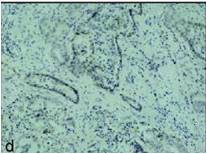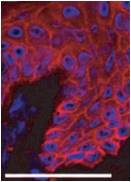A recent Endocrine-Related Cancer paper from the University of Siena shows the use of Ximbio's Anti-EGFR clone EGFR1 in immunohistochemical analysis. These studies showed that microsomal PGE-synthase 1 was correlated with EGFR expression in advanced human prostate tumours. Furthermore microsomal PGE-synthase 1 and prostaglandin E2 signalling sensitised tumour cells to EGFR inhibitors.

Immunohistochemical analysis of EGFR expression in advanced prostate cancer. (Finetti et al. 2015. Endocr Relat Cancer.)
EGFR, once activated, leads to the activation of multiple signalling pathways that are involved in regulating cellular proliferation, differentiation and survival. EGFR is overexpressed in a variety of cancer types and is associated with a poor prognosis and survival. As a result, multiple anti-cancer agents have been developed against EGFR; the most common being monoclonal antibodies which prevent the binding of the EGF ligand.
Clone EGFR1 was raised against the EGF receptor on whole A431 human epidermal carcinoma cells. As well as immunohistochemistry clone EGFR1 has also been shown to have applications in flow cytometry, immunofluorescence, immunoprecipitation, Western blotting and tumour imaging and therapy.

Immunofluorescence staining of human interfollicular epidermis with DAPI nuclear counterstain (blue). (Jensen et al. 2006. Proc Natl Acad Sci U S A. 103(32):11958-63.)
Clone EGFR1 was develoepd by Peter Goodfellow's lab at the Cancer Research UK London Research Institute; now situated at The Francis Crick Institute. During his time with Cancer Research UK, in a race against his competitors in America he discovered the exact location of the Testis Determining Factor gene, a gene that determines maleness. These studies won him the 1995 Louis-Jeantet Prize and the 1997 Francis Amory Prize of the American Academy of Arts and Sciences.
View the datasheet for more information and publications.
HAVE YOU REGISTERED?
Join the ever-growing global Ximbio community. Register and receive updates about new reagents, institutes and new features being added to the website.
